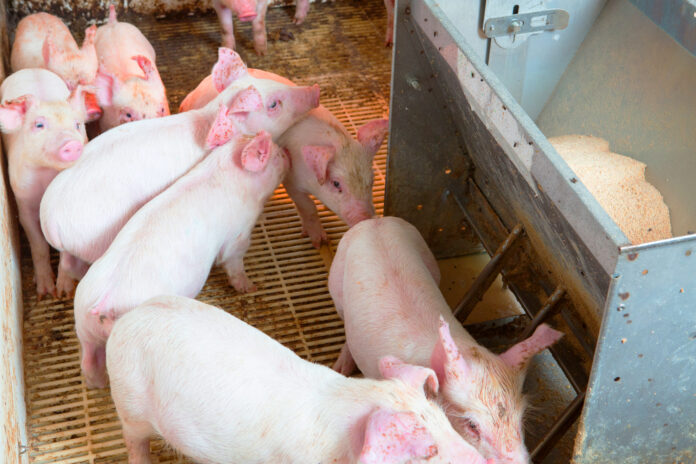By Geoff Geddes
Editor’s note: This article was adapted from a piece written for Genome Alberta. For more information, contact Michael Dyck at mkdyck@ualberta.ca.
Renewed research funding expands projects

Generally speaking, research project extensions are rarer than pigs that skip a meal.
Given that reality, it should speak volumes that a Genome Alberta-led project on improving disease resilience in pigs has been extended for three more years, worth $1 million in additional funding from Genome Canada – Genome Alberta’s not-for-profit parent organization, funded by the Government of Canada, which acts as a catalyst for developing and applying genomics technologies to create economic and social benefits for Canadians.
That is good news for producers, as it means more progress to protect their pigs and their bottom line.
“The new funding from the Genomic Applications Partnership Program [GAPP] will allow for additional research to validate some of our results, as it extends our current project from five years to eight years,” said Michael Dyck, Professor, Department of Agricultural, Food, and Nutritional Science, University of Alberta. “It will sustain the work we have been doing on disease resilience with PigGen Canada as an industry partner.”
PigGen Canada is a not-for-profit organization with membership from the Canadian, U.S. and European swine genetics industries, including Alliance Genetics, AlphaGene, DNA Genetics, Fast Genetics, Genesus, Hypor and Topigs Norsvin. The goal of PigGen Canada is to represent the Canadian swine genetics industry with a single voice and develop strategies and support for research, in concert with the priorities of the Canadian pork industry. More information can be found on PigGen Canada’s website: PigGenCanada.org.
“The main objective of the research for the GAPP project is to capitalize on key findings from our past research on Disease Resilience in Pigs,” said Dyck. “This will involve validating genomic and phenotypic indicators so that they can be incorporated into the breeding programs of PigGen Canada member companies. Selection for disease resilience in breeding stock is expected to reduce susceptibility to disease in the pig population and reduce the impact of disease on overall productivity.”
More resilient animals equal fewer disease issues

The GAPP project involves using genomic tools to use bio-assays and genetic markers to identify animals that show superior resilience in the face of disease. From their efforts to date, researchers have pinpointed key phenotypic and genetic indicators that separate resilient pigs from their peers. With the project extension, they can further validate these traits and show how to incorporate them into breeding programs. Components of this research were published in the Fall 2020 edition of the Canadian Hog Journal article, “Selection of pigs that are more disease-resilient,” and in the proceedings from the 2020 Banff Pork Seminar: Advances in Pork Production, Volume 31, 137-144.
“As part of this ongoing research, we will continue assessing animals via the Natural Disease Challenge Model,” said Dyck. “Working with CDPQ [Centre de développement du porc du Québec], we set up a facility where animals are exposed to various pathogens in a commercial environment to see how they respond to a commercially relevant disease challenge.”
One of the prime indicators of resilience is an animal’s genotype and the genes that control an animal’s immune response, enabling pigs to continue growing and being efficient in a production environment when pathogens are present. The researchers also found indicator traits that predict which animals maintain their current food and water intake in the face of a disease challenge, and they hope such traits will help breeding companies better select more resilient pigs for pork production.
In collaboration with the University of Guelph, the researchers evaluated a test for immune responsiveness that can be conducted on young, healthy pigs, and they identified pigs that subsequently did better in the face of the disease challenge. These are the types of traits they are hoping to validate with more animals during the extension period.
In collaboration with Iowa State University and the University of Saskatchewan, the researchers will look at the association of these resilience traits and predictors with other important performance traits, so they do not select for resilience while having a negative effect on daily feed intake or average daily gain in an environment without major disease, for example. Clearly, researchers need to understand these interactions before incorporating traits into a breeding program.
Animal welfare improves with better genetics

“By working directly with breeding companies through this project, we are creating tools that can be used to improve pig performance through all levels of the genetic pyramid,” said Dyck. “If we can give breeders the tools to select more resilient animals, these will filter down to commercial herds and reduce costs associated with disease detection and treatment. This should enable us to use fewer antibiotics, thereby addressing society’s concerns around the use of antibiotics in livestock production.
Perhaps most importantly, decreasing the impact of disease also addresses the issues that come with exposure to pathogens, enhancing animal welfare in the process. Producers will know that the pigs they market come from an optimal health environment, and that knowledge can be passed along to consumers, enhancing public trust.
Though achieving results from research is often satisfying, the three-year extension on this project takes that feeling to another level.
“Often with research, you don’t get the opportunity to see the outcome integrated and fully applied in industry. The extra funding lets us take that next step of collaboration, so that’s very gratifying,” said Dyck. “It was PigGen Canada that came up with the initial idea of working with Canadian researchers on using genomic tools to improve disease response. I want to commend PigGen Canada for having the vision and ability to continue working with us to make this happen.”





